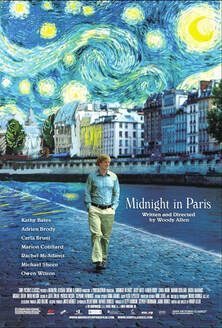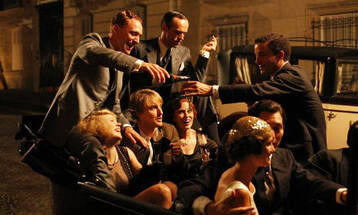
“…that's what the present is. It's a little unsatisfying
because life's a little unsatisfying.”
If you happen to be an Owen Wilson devotee, you most likely will have
noticed that his characters’ favourite word in the English language, appears to
be “wow”. Spoken over one hundred times throughout his filmography,
there have been many moments deserving of the ‘wow’ treatment, but none
seem more fitting than those within Woody Allen’s Midnight in Paris -
the writer/director’s 41st film. For Paris is a rare, perceptive comedy, one
which primarily deals in the recurring themes of Allen’s earlier, critically
lauded work, but adds something unexpected, fresh and invigorating into
the artist’s seasoned mix: time travel (of sorts).
The story follows the Parisian-set travels of Gil (Wilson) and Inez
(Rachel McAdams), a successful Hollywood-based couple who are teetering on
the edge of romantic trouble, within their idyllic paradise. For in attempting to write his first novel, Gil falls madly in love with the city, wanting nothing more than to walk the streets that were once populated by his artistic idols of the 1920s. Inez couldn’t think of anything more tedious and actively chooses not to embrace Gil’s love affair with Paris. One night, however, when Gil is forced to take a midnight stroll without Inez, a stunning 1920s vehicle pulls up alongside him, and its passengers invite him to join them at a party. Bemused, but delighted, Gil eagerly climbs aboard and – unbeknownst to him – is transported back in time to Paris, of the roaring twenties…

very real danger of nostalgia, and how we as humans sometimes yearn for a rose-tinted view of a ‘golden age’. Take Gil, for example - he looks upon 1920s Paris as being his idea of a ‘golden age’, and is swept up in the seemingly never-ending parties and intellectual discussions with Ernest Hemmingway et al. But there comes a point in which Gil realises that this life he so yearns for (including a relationship with the beguiling Adriana, played by Marion Cotillard), is completely unattainable.
When Adriana reveals that she in fact longs for the 1890s and not her present (the 1920s), Gil finally understands that people, by and large, will always desire a ‘better time’ if they are not able to be content with their present. Sometimes, to experience feelings of satisfaction once more, people will often become drawn to their past. So, whilst Gil might be unsatisfied with his experience of the present, this sudden epiphany however, shakes him free from a trance-like state. It releases him to understand that he should try to find satisfaction in his present life, not a by-gone era, as well as looking forward to the future.
Looking back on the film, Gil’s realisation could be interpreted as a simplistic ‘live-for-today’ ideal, but I would argue that the film’s overall message has stronger ties to that of the Bible’s view of nostalgia, than immediately apparent. For example, the film ultimately believes that to yearn after another time is foolish, just as it says in Ecclesiastes, where the author warns against allowing nostalgia to alter your mindset:
It is not wise to ask such questions.”
(Ecclesiastes 7:10, ICB)

For Christians, therefore, the past is not a time we should yearn
for, or attempt to return to/replicate. Rather, it is only by living
in the present with God at the centre of our lives, that we are
able to be saved from the consequences of our sin (both now
and eternally) and experience true fulness of life, in
relationship with God. If we choose to acknowledge what Christ
has done for humanity in dying on the Cross to save you and
me, we need to actively turn from our past mistakes
and towards God’s Way. Then we won’t ever need to look back
at our past or yearn for another time. For when we commit
our lives to Him, trusting His promise to save, we need only look forward - towards His goodness that is available to us all, this day, and our eternal salvation. For the future with God is bright and it will give
us everything we need to be fulfilled, whilst living in the past will rob us of fulness of life here, and in eternity.
The old has passed away; behold, the new has come.”
(2 Corinthians 5:17, ESV)
Prior to watching the film for yourself, however, why not pray for God to speak to you throughout the film and if you feel comfortable, pray this prayer over this and all of your future, film-watching experiences:
Dear Lord,
As I watch this film, I ask that you would be present here with me. Highlight to me anything within it that is honourable, anything that can be used in conversation for your Kingdom purposes. Amen.
Midnight in Paris is now available to stream on Netflix (UK)

 RSS Feed
RSS Feed